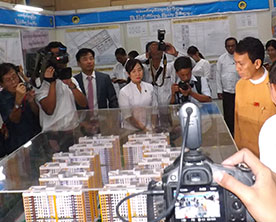On December 14, 2017, the Myanmar Government’s Department of Urban Housing Development(DUHD) held a press conference, announcing the issuing of the new Condominium Rules. The new law gives foreigners the opportunity to legally invest in the local condominium market. The condominium rules are the final steps of the implementation of the Myanmar Condominium Law, which was approved in 2016. This new Condominium rules were approved by the Union Minister of Construction on December 7, 2017. Under the former draft of the Condominium rules, foreigners could own 40 percent of the total units above the 6th floor only. Now foreigners will be allowed to own 40 percent of the total floor area, regardless of the floor level. And also any foreigners will be allowed to purchase the units and there are no residency/employment requirements. The minimum requirements for a condominium project are to build on at least 20,000 square feet (0.45 acres) or 1858 m2 of of land, lower than previously required. If certain floors are assigned as commercial spaces, these floors cannot be allowed to use for residential purposes. And also, separate entrances are necessary. But, it will be entirely possible to have commercial units in a mixed use building and these may also be allowed to receive a unit title.
In a project, a single owner can own up to 25 % of the total housing units, and a developer needs to sell at least 75 % to end users but can keep up to 25 % of the housing units. As per the Condominium Law, a unit can be freely mortgaged, transferred and sub-leased. The titles and the transfers are registerable and will be administered by the Department of Urban Housing Development.
According to the new rules, registration fee for transfer of unit is in a scale and not a straight percentage. In addition, developers will be allowed to pre-sell n e w h o u s i n g units only after the completion of 30 % of the f o u n d a t i o n work. And then not before, the developers need to offer some protection to unit purchasers. The developer must deposit an amount, 20 % of the total investment cost before the issuing the unit titles. Now a developer license will be valid for five years to prepare a project, although the developer took three years according to the former draft of the Condominium rules.
This is the final piece of the jigsaw of puzzle in the long awaited condominium law. All those involved in the property sector, are still waiting for at least some bits of sunshine amidst all the doom and gloom of the past two years.










